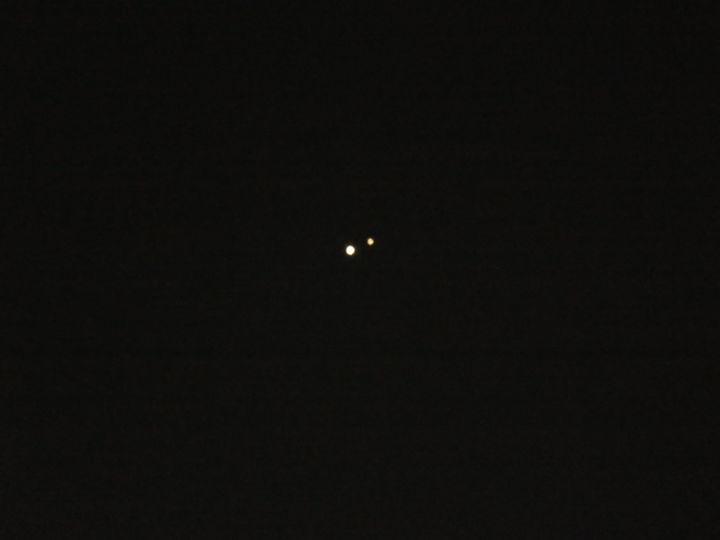In this reflective writing Will Falk offers his thoughts on the conjunction of Jupiter and Saturn, human civilization and his thoughts on the natural world.
By Will Falk
I viewed the conjunction of Jupiter and Saturn from my parents’ back porch in Castle Rock, CO, a Denver suburb.
It took my dad and I several minutes to locate the planets amongst the streaking, blinking lights of airplanes crossing the southwestern sky. I wanted the experience to be more joyful than it was. But, it was hard to marvel at the heavens while the earth around me was being destroyed. Automobiles on Colorado Highway 86, about a hundred yards from where I stood, sped their way to their drivers’ homes at the end of the work day. Construction workers putting in a new high-pressure gas line across the street wrapped work up for the day. With their boots and Carhartt jackets covered in an early winter slush, the men bantered with the relieved voices that workers who hate their job always banter with at 5 pm.
All this commotion created a harsh soundtrack for my Great Conjunction. It was hard to focus on the tiny specks of light that the internet told me were planets hovering just above the sunset. The noise the highway traffic made dominated all other sounds. I heard the friction between spinning tires and hard asphalt as it keened. I heard the screams of forests clearcut for the rubber plantations that tire production requires. I heard the wailing of long-dead algae in the oil ripped from its underground resting place and blended with shattered stones to form asphalt. I speculated whether these sounds were chastising me for my lack of wonder.
Being December 21, it was difficult not to think about Jupiter and Saturn’s reaction to viewing the perverse electric constellations humans have hung on the Earth like the suburban Christmas lights surrounding me. Feeling this bitterness, I thought about asking my dad what was wrong with me, why I always seem drawn to ugliness and pain, and if he thought I was ungrateful.
I did not want to disturb his enjoyment of this historic astronomic event.
This experience quickly reflected something I’ve been confused about for a long time: Why do so many people find it so easy to see the beauty surrounding us when we must overlook so much destruction when viewing that beauty? As the stars intensified in the deepening evening and this question banged around in my head, a blue jay landed in the snow below one of my mother’s bird feeders.
I confess that I found the blue jay to be infinitely more fascinating than the distant planets. The feeder had been recently filled and a sizable pile of seeds sat in the snow and mud. The blue jay could have gorged himself on a huge meal, but instead he pecked at the ground here and kicked at the snow there with relatively no concern about the pressure I assumed winter would place on him to consume calories. His movements were lazy and nonchalant. I realized the blue jay could not care less about worlds a bird could never fly to, about two pinpricks of light representing places that, as far as any of us know, do not produce a speck of bird feed.
As Jupiter and Saturn silently disappeared over the horizon, I wondered if they simply could not bear to witness the scars lacerating the skin on their sister’s continents. My attention returned to the blue jay who continued to ignore the sunset and the stars. I was tempted to conclude that the abused beings of the world are bored with beauty, annoyed by the current human insistence on aesthetic appreciation.
The sun’s dying light was pretty.
But, it was also entirely commonplace for those who live beneath the sky. The stars were magical, but their enchantment was distant. Besides predicting romantic compatibility and sending a wayward meteor every few million years, the stars only exert so much influence over earthly affairs.
The sun’s very last orange detonated in a thin line across the west. I hoped that, beyond beauty and ugliness, explosive rage has its place, too.
Will Falk is a DGR member, lawyer for the natural world and is currently journeying in conversation with the Ohio River. You can read about Will’s journey with the Ohio River here.


I am the same I cannot shut it out. I think because I did for so many oblivious decades
Wow, Castle Rock is now a suburb of Denver? When I was last there in the early 1980s, it was totally separate from Denver, about 1/2 hour to the south. Perfect example of the cancerous growth of the human species, made far worse by its gluttonous consumption and industrial living. I climbed to the top of Castle Rock once (the butte the town is named after), and I was amazed at how loud the tire sounds were from Interstate 25, even though it must have been at least a couple of miles away from there.
I also never fail to experience the miserable industrial noise and artificial light of modern society. When I walk outside I always try to focus on the sky, trees & other plants, birds, squirrels, etc. But unless you stick your head in the sand, there’s no escaping the massive industrial noise pollution, and the light pollution dominates the sky at night (I live in a much larger metropolitan area than Denver).